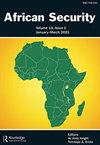Governing “Ungoverned Spaces” in the Foliage of Conspiracy: Toward (Re)ordering Terrorism, from Boko Haram Insurgency, Fulani Militancy to Banditry in Northern Nigeria
IF 1.3
Q2 POLITICAL SCIENCE
引用次数: 57
Abstract
ABSTRACT This article explores the dominant narrative of ill-governed or ungoverned territories in the northern region of Nigeria where informality and socioeconomic deficit fashioned the mannerism of everyday life. Reconnoitering ungoverned territories, positing that radical jihadist and non-jihadist movements and criminal-armed groups are ideologically driven by localism and informal networks, particularly in the areas unkempt by the state. The paper interrogates to what extent ungoverned spaces embolden the recruitment of criminal and terrorist groups in northern Nigeria. It explains the complex security paradoxes confronting the Nigerian state, it analyses the Boko Haram insurgency, Fulani militancy and banditry within the context of ungoverned spaces that continuously breed terrorist organizations, and criminal networks, that pose an enormous risk to human security. It adopts a qualitative approach and spatial network analysis using Geographical Information System (GIS). The paper argues that the primordial negligence of ungoverned areas with limited state surveillance or unharmonized state presence, controlled by informal networks and hybrid arrangements creates an enabling environment for warlordism, religious fanaticism and tribal self-defense forces. It further demonstrates that governance failure in these regions stimulates illegal movement of arms and ammunition, the raw material for bombs, illegal drugs and foreign machines, and becomes abodes for Boko Haram jihadist and non-Boko Haram armed groups. The paper concludes that ungoverned spaces could be morphed into a production site for Weapons of Mass Destruction (WMD) by the terrorists in the near future, thus, until the Nigerian state pays attention to the territories under-governed or poorly governed, it will become difficult to win the war against terrorism, Fulani militancy and banditry through military response. Therefore, good governance that transcends ethnic chauvinism remains a veritable weapon in conquering multilayered security quagmires facing the giant of Africa.在阴谋之叶中治理“无人管辖的空间”:走向(重新)命令恐怖主义,从博科圣地叛乱、富拉尼武装到尼日利亚北部的土匪
本文探讨了尼日利亚北部地区治理不善或不受治理的领土的主导叙事,在那里,非正式和社会经济赤字塑造了日常生活的风格。侦察无人管辖的地区,假设激进的圣战分子和非圣战分子运动以及犯罪武装团体在意识形态上受到地方主义和非正式网络的驱动,特别是在国家不受管制的地区。这篇论文质疑,在尼日利亚北部,不受管制的地区在多大程度上助长了犯罪和恐怖组织的招募。它解释了尼日利亚国家面临的复杂的安全悖论,它分析了博科圣地叛乱,富拉尼武装和土匪在不受治理的空间内不断滋生恐怖组织和犯罪网络,对人类安全构成巨大风险。本文采用定性分析方法,利用地理信息系统(GIS)进行空间网络分析。本文认为,在国家监督有限或国家存在不协调的情况下,由非正式网络和混合安排控制的未治理地区的原始疏忽,为军阀主义、宗教狂热和部落自卫力量创造了有利的环境。它进一步表明,这些地区的治理失败刺激了武器弹药、炸弹原料、非法毒品和外国机器的非法流动,并成为博科圣地圣战分子和非博科圣地武装团体的藏身之地。本文的结论是,在不久的将来,不受管制的空间可能会被恐怖分子变成大规模杀伤性武器(WMD)的生产场所,因此,除非尼日利亚政府关注管理不善或管理不善的领土,否则很难通过军事反应赢得打击恐怖主义,富拉尼武装和土匪的战争。因此,超越种族沙文主义的善政仍然是克服非洲巨人所面临的多层安全困境的真正武器。
本文章由计算机程序翻译,如有差异,请以英文原文为准。
求助全文
约1分钟内获得全文
求助全文

 求助内容:
求助内容: 应助结果提醒方式:
应助结果提醒方式:


